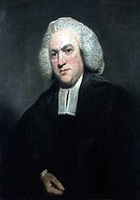Joseph Warton
Joseph Warton Poems
Queen of every moving measure,
Sweetest source of purest pleasure,
Music; why thy powers employ
Only for the sons of joy?
...
Fair Child of Sun and Summer! we behold
With eager eyes thy wings bedropp'd with gold;
The purple spots that o'er thy mantle spread,
The sapphire's lively blue, the ruby's red,
...
Lo! Spring, array'd in primrose-colour'd robe,
Fresh beauties sheds on each enliven'd scene,
With show'rs and sunshine cheers the smiling globe,
And mantles hill and vale in glowing green.
...
O parent of each lovely Muse,
Thy spirit o'er my soul diffuse,
O'er all my artless songs preside,
My footsteps to thy temple guide.
...
Joseph Warton Biography
English critic and poet, eldest son of Thomas Warton (see below), was baptized at Dunsfold, Surrey, on the 22nd of April 1722, and entered Winchester school on the foundation in 1735. William Collins was already there, and the two formed a friendship which was maintained through their Oxford career. They read Milton and Spenser together, and wrote verses, which, published in the Gentleman’s Magazine, attracted the attention of Dr Johnson. Warton went to Oriel College, Oxford, in 1740, and took his B.A. degree in 1744. He took holy orders, and during his father’s lifetime acted as his curate at Basingstoke. He then went to Chelsea, London; but eventually returned to Basingstoke. He married, became rector of Winslade (1748), of Tunworth (1754); in t755 he was appointed a master in Winchester school, and headmaster in 1766. He was not a successful schoolmaster, and when the boys mutinied against him for the third time he wisely resigned his position (1793).)
The Best Poem Of Joseph Warton
Ode To Music
Queen of every moving measure,
Sweetest source of purest pleasure,
Music; why thy powers employ
Only for the sons of joy?
Only for the smiling guests
At natal or at nuptial feasts?
Rather thy lenient numbers pour
On those whom secret griefs devour;
Bid be still the throbbing hearts
Of those, whom death, or absence parts,
And, with some softly whisper'd air,
Smooth the brow of dumb despair.

Oh